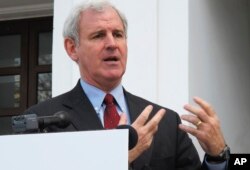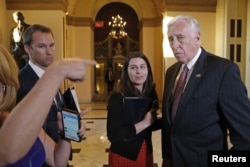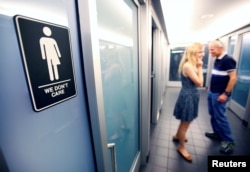A prayer opens every day of business on the floor of the U.S. House of Representatives.
A military chaplain buys religious vestments from a federal contractor. A religious charity sets up a soup kitchen using government grant dollars.
Each one of these acts reflects the complex everyday interactions between the U.S. government and religious communities, balancing religious freedom with individual rights.
An amendment attached to the 2017 National Defense Authorization Act that passed the House on Wednesday sparked heated debate about that balance, drawing amendment supporters and opponents into the country's ongoing battle over gay, lesbian and transgender rights.
The Russell Amendment seeks clarification of an apparent conflict between the landmark 1964 Civil Rights Act, which allows religious organizations exemptions based on their beliefs, and a 2014 executive order from President Obama ordering protections for gay, lesbian and transgender employees of federal contractors. The stakes for both sides in the conflict are high - religious organizations want to receive federal funding while maintaining their freedom of conscience. Lesbian, gay, transgender people see the religious exception as an excuse for discrimination.
Republicans and Democrats debating on the House floor Wednesday spoke about the amendment as if viewing two completely different pieces of legislation.
“There is not one single thing in this thing that discriminates against anybody,” said Rep. Bradley Byrne, a Republican from Alabama. “There is not one single mention of LGBT.”
Rep. Jerrold Nadler, a Democrat from New York, said, “We now call it religious liberty – the ability of a private contractor to fire someone – or refuse to hire them – just because they’re gay or lesbian.”
Amendment origins
Rep. Steve Russell, a Republican from Oklahoma, told VOA his amendment builds on existing U.S. law to protect the First Amendment rights of religious organizations working with the government.
“We didn’t introduce any new law, we simply said that these religious groups, religious contractors and service providers, that they will not be prohibited in their charters from being considered for contracts,” Russell said.
Chad Pecknold, an associate professor at Catholic University who studies the intersection between culture and religion, said the amendment provides needed clarity.
“Since the executive order was so ambiguous in the religious liberty protections it provided, it seems to me that the Russell Amendment is just a common sense clarification to keep intact the religious liberty protections that were already enjoyed,” he said.
Pecknold said the amendment would help resolve everyday conflicts of conscience, such as military chaplains having to purchase materials from federal contractors who do not share their beliefs.
But opponents say the amendment would allow federal contractors to refuse employment of lesbians, gays and transgender persons in a move that amounts to taxpayer funded discrimination.
Rep. Adam Smith, the ranking Democrat on the House Armed Services Committee, said Wednesday that he would vote against the defense bill because of the amendment. He told VOA last week the amendment would be “a license to discriminate against the LGBT community, and I stand strongly with the president to stop that discrimination any way we can, and we shouldn’t be doing business with businesses that discriminate,” Smith said.
“Congress owes it to LGBT workers and their families to ensure that they are equally protected by our laws and not singled out for mistreatment,” Democratic Whip Steny Hoyer said in a statement on the amendment released late Tuesday.
“When Republicans in Congress take actions that signal otherwise, it emboldens those who would bully, harass and discriminate,” Hoyer said.
Key distinction
The use of taxpayer dollars as directed in the Russell amendment is important, says Matthew Bulger, legislative associate for the American Humanist Association. A lesbian or gay person pays money into the government system that eventually could pay out their money in the form of a grant to a religious organization that could then turn around and legally discriminate against them.
Private organizations are free to do what they want with their money – but the use of taxpayer dollars takes the debate to a different level.
Bulger used the example of a religiously run soup kitchen that receives federal grant money. The soup kitchen cannot legally turn away a lesbian or gay person from using their services but it could refuse to hire them.
“They’re taking taxpayer money, using it to discriminate against those taxpayers and then claiming that the government is infringing upon their rights to discriminate against private citizens,” said Bulger.
The American Humanist Association joined with many religious organizations that believe the Russell Amendment would cheapen the important public service work they perform, bringing politics into an entirely new realm of American life.
“We want to make sure that Americans are able to practice their faith, but we also want to make sure that Americans aren’t being discriminated against with government backing,” said Bulger.
Rep. Russell disputed the taxpayer argument.
“That’s like saying the U.S. chaplain of the House of Representatives doesn’t have the right to open a session in prayer because his salary depends on taxpayer funding. That’s like saying to the military, you can’t have chaplains because they draw a military salary – it’s just absurd,” he told VOA.
The debate about the conflict between private rights and public law and protections has intensified in recent weeks following the bathroom bill controversy in North Carolina.
Rep. Russell said, “I’ve heard that this is a bathroom bill which is just absolutely absurd.” He said, “This is a fight to defend these contracts and nothing more.”
Veto threat
The Russell amendment could have implications beyond the debate between religious freedom supporters and advocates for lesbian, gay and transgender rights by stopping the entire 2017 defense spending bill at the president’s desk.
White House press secretary Josh Earnest would not say Tuesday if the presence of the Russell amendment in the bill would trigger a veto, adding that the president had a number of concerns about the defense spending bill and that “he has been forceful in using his executive authority to prevent discrimination.”
Russell said he did not think the amendment would trigger a veto of the defense spending bill.
“There have been threats of veto before,” he told VOA.
He went on to note the amendment “absolutely reinforces existing law – so why would you veto something based on constitutional precedent, the First Amendment of the Bill of Rights and existing law.”













